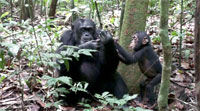Max Planck researchers report 18 cases of adoption of orphaned youngsters by group members in Taï forest chimpanzees. Half of the orphans were adopted by males.
In recent years, extended altruism towards unrelated group members has been proposed to be a unique characteristic of human societies. Support for this proposal came from experimental studies with captive chimpanzees. A team of researchers with the Department of Primatology at the Max Planck Institute for Evolutionary Anthropology (Leipzig/Germany) now reports 18 cases of adoption of orphaned youngsters by group members in Taï forest chimpanzees. Half of these orphans were adopted by males and remarkably only one of these proved to be the father. Such adoptions by adults can last for years and imply extensive care towards the orphans. These observations reveal that, under the appropriate socio-ecologic conditions, chimpanzees care for unrelated group members and that altruism is more extensive in wild populations than was suggested by captive studies (PLoS ONE, January 26, 2010).
